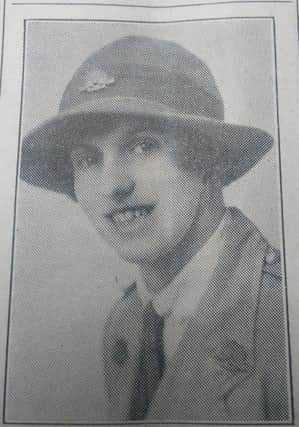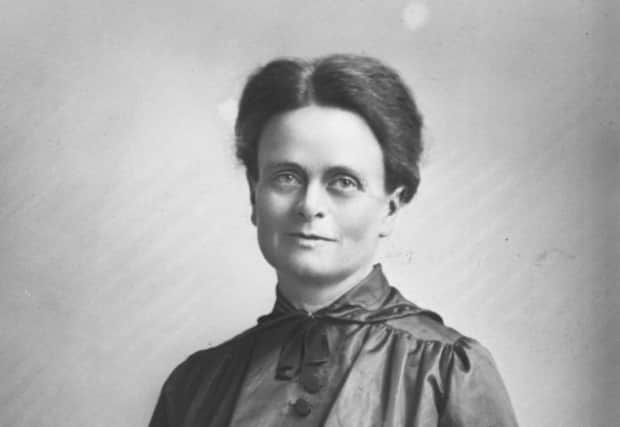Bertha Mould — Rotherham’s unsung hero of the First World War


A BLOUSE made from a blanket, an ox-drawn cart for an ambulance and a death-defying climb over an icy girder across a raging stream — the wartime exploits of Bertha Mould would make Florence Nightingale or even Indiana Jones blanch.
But the astonishing story of this little-known Rotherham volunteer will finally be given public recognition this year as domestic violence charity Rotherham Rise plans to feature her in a project recognising some of the town’s greatest women.
Advertisement
Hide AdAdvertisement
Hide AdWe delved through the archives of the Advertiser to uncover details of Bertha’s astonishing bravery as related in an article June 1938, which also focused on the medical marvel’s efforts to recruit new members for Rotherham’s Women’s Legion branch.
Members of the Rotherham and Sheffield branches, the Advertiser reported, were expected to take part in the Territorial Army display in Whirlow Park the following week.
But the paper said just three recruits for the Legion had come forward in six weeks, which it described as “dismal” and “deplorable for an area where services of its members would be needed probably more than in any other part of the country”.
The disappointing response from Rotherham could not be due to lack of leadership, the paper said, “for it is hard to imagine a more inspiring leader than Mrs Mould, who is one of the Divisional Commandants for Yorkshire”.
Advertisement
Hide AdAdvertisement
Hide AdIt went on: “Mrs Mould has had a very thorough experience of warfare and has no illusions about it.
“Through her experience she realises the vital necessity of the establishment of an efficient Women’s Legion before the outbreak of any hostilities.”
The Advertiser did its bit to inspire more recruits by relating her 21-year service.
“In 1915, when she was only 17 years of age, she went out to Serbia as an ambulance driver attached to Dr Elsie Inglis (pictured below), who started the Scottish Women’s Hospitals,” the Advertiser said.


Advertisement
Hide AdAdvertisement
Hide Ad“When the Serbian Retreat took place in that year, Mrs Mould’s ambulance was blown up and she struggled on with her work with the aid of a wagon drawn by oxen.
“Then she was captured by the Germans and for two weeks and practically no food and nowhere to sleep.
“With Dr Inglis and two other ambulance drivers, she was forced to work as a sanitary inspector, cleaning up the terrible conditions existing at that time.
“Later, Mrs Mould did nursing work in a Serbian hospital.
“Owing to the extreme scarcity of food, it was only possible to have one meal a day, and on Christmas Day a present of three loaves of bread was shared among 15 persons.
Advertisement
Hide AdAdvertisement
Hide Ad“Once, Mrs Mould had to crawl on an iron girder covered with ice over a raging stream in order to get back to hospital after the bridge over the stream had broken down.
“Mrs Mould was dressed in a blouse made from a blanket, a skirt and some Serbian sandals, and when the American Consul saved her from being interned in Austria, the first thing he did was to provide her with some proper clothes.
“When Mrs Mould returned to England, she found he was too young for service, as an age limit of 21 had been fixed, but the Women’s Legion had been formed and she immediately joined.
“These and other experiences have not damped Mrs Mould’s spirit — they have quickened it as should the story of her adventures inspire other young women to be ready to play their part should the necessity arise.
Advertisement
Hide AdAdvertisement
Hide Ad“The only way they can be ready to do the work they will be called upon to do is to enlist in the Women’s Legion and so receive the necessary training.”
Women’s Legion members were needed to volunteer to train as auxiliaries for the Defence Forces, the Advertiser said, where they would work as drivers and in clerical capacities to free up men for military service.
Training was given at Mrs Mould’s home at The Grange, Kimberworth, as ARP and car maintenance lectures and evening classes.
With Mrs C. Spafford of The Mount, Sheffield, the Advertiser said, Mrs Mould is “sparing no effort in an earnest endeavour to achieve and maintain a hundred per cent organisation in Yorkshire”.
Advertisement
Hide AdAdvertisement
Hide AdScottish Hospitals records recount that Bertha was born Bertha Louisa Madan was born in Didsbury near Manchester in 1896 to Charles and Bertha Madan.
Of her war service, they read: “She was employed as a driver and was often responsible for chauffeuring Dr Elsie Inglis from town to town.”
After Belgrade fell in October 1915, the hospital was moved south and the men were “forced into accommodated that was run down, filthy and cold”.
The hospital was known as The Zoo due to the cramped and unpleasant conditions.
Advertisement
Hide AdAdvertisement
Hide AdBertha and her colleagues were said to have spent three months working in extreme conditions with starving exhausted men before they were repatriated.
The records recount: “On the 12th of February, 1916, the women were greeted by cheering crowds but for most of these stoic women all their thoughts were of the Serbs they left behind.”
Seven years after the war, Bertha married Gilbert Edward Mould, of Thundercliffe Grange, Kimberworth, at St Joseph’s Church in Wath.
She died in Norfolk in 1956 aged 59.
Rotherham Rise chief executive Sue Wynne said: “I came across Bertha’s story when I was researching for inspirational, historical women of Rotherham —what an incredible woman.
“I was immediately intrigued by what Bertha had achieved.
Advertisement
Hide AdAdvertisement
Hide Ad“Women nurses and doctors who went to Serbia in 1915 are still remembered their today.
“They have been recognised by the people of Serbia for the contribution they made in very desperate times and there are even Streets named after some of the women that went to Serbia.
“I am interested in finding out about woman who have connections with Rotherham and who have gone onto to do things that have been inspiring, done the unexpected, or have made a difference.
“The women in the First World War have largely been ignored for their contributions, although I sense that there is renewed interest about women’s roles and identities in the war efforts, which are complex and sometimes misunderstood.
Advertisement
Hide AdAdvertisement
Hide Ad“Female doctors and nurses from Britain who went to Serbia were called angels and saints.
“Rotherham Rise will be working towards celebrating the life of Bertha and other Rotherham women in the near future at the women’s centre in Main Street.
“We hope this will include a talk about Bertha.”
If you have any information that you would like to share about Bertha or other women of achievement, email [email protected].